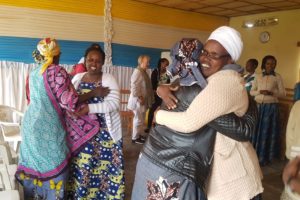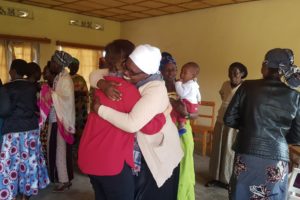Healing wounds of the past in Rwanda
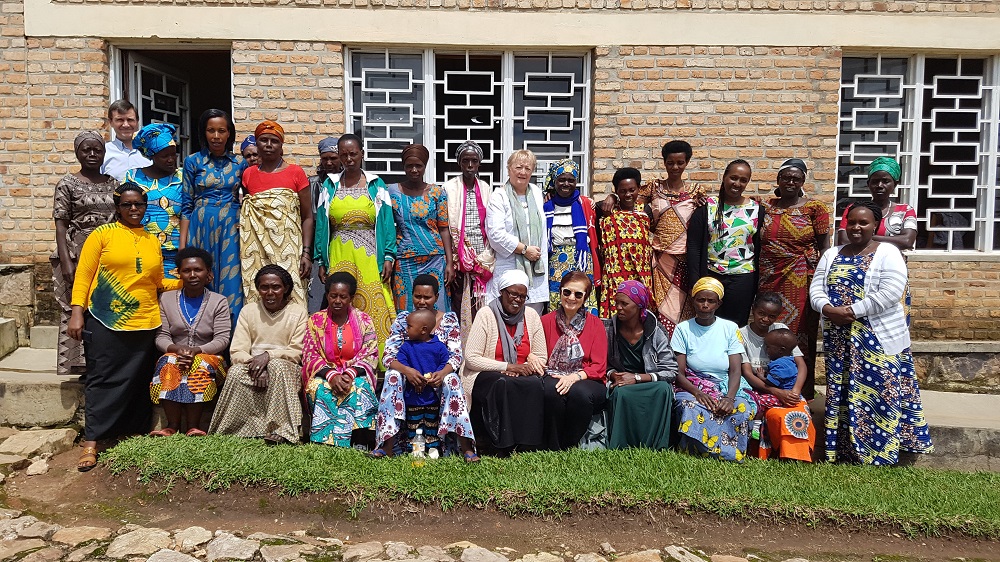
It is 11:37am in Muhanga, a town in the southern province of Rwanda and a group of 24 women have gathered despite the drizzle, to welcome a delegation of Interpeace and Never Again Rwanda. These women have all experienced a tragic past, but it’s not until you start talking to them, that this becomes evident. Their testimonies bring to the surface a tragedy that struck their country 25 years ago – the 1994 Genocide against the Tutsis in Rwanda.
Clarisse (not her real name) is a Tutsi woman in her early 50s who married a Hutu husband. They had five children and lived happily together before the genocide brought calamity and hardship to her life. Clarisse’s husband was brutally murdered for marrying a Tutsi, but she escaped death with her children.
However, life for Clarisse after the genocide was unbearable. Living without a husband meant she had to assume unfamiliar roles in a very harsh society, where social cohesion had been disrupted by violent conflict.
“I was rejected by my family because they felt that I had betrayed their trust by marrying a Hutu man. On the other hand, my husband’s family rejected me because they felt that I was the root cause of my husband’s death,” said Clarisse.
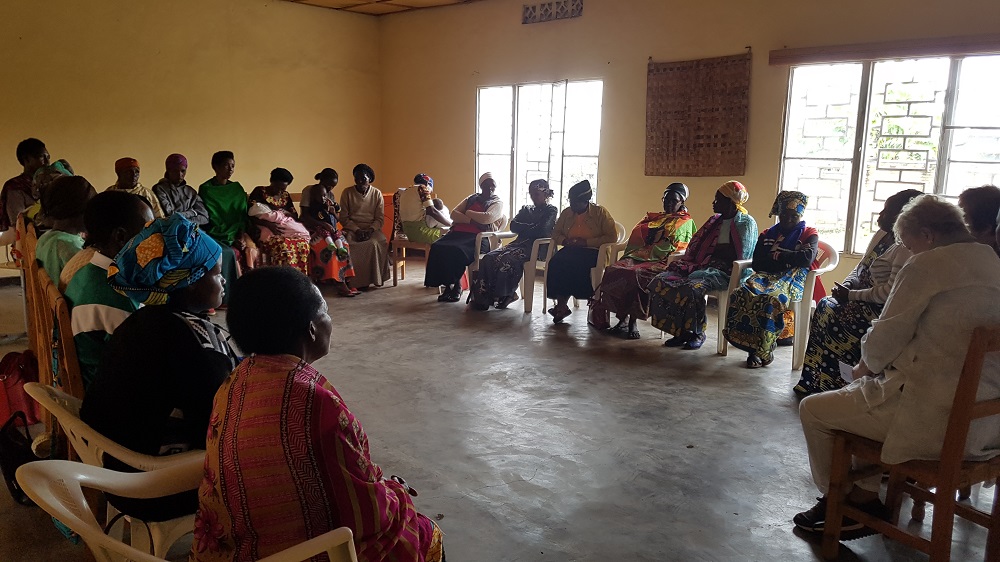
Muhanga, Rwanda. Photo credit: Jude Fuhnwi
Like many survivors of the genocide against the Tutsis, society rejected Clarisse. She explained that people around her interacted, shook hands and hugged each other, but when it came to interacting with her, they just waved. “To make matters worse my children became rebellious against me and I developed hatred towards them,” she added
As the rejection and stigma deepened, Clarisse became depressed and attempted to take away her own life on different occasions. Clarisse was not alone. Many survivors of the genocide shared similar or even worse experiences.
“I was silent about what was happening to me and had a lot of self-hatred. I am Hutu and was married to a Tutsi. Got a lot of hatred from my family. His family did not accept me either. I transferred all the hatred to my child, and he hated me because I had no family. I was going to commit suicide,” explained Anne, another member of the group who survived. “But the psychotherapist supported me. We had a joint session with my child, and she explained to him that it was not my fault,” she added.
A mental-health survey from Rwanda’s Ministry of Health in 2018 showed that genocide survivors suffer a higher prevalence of depressive disorders, post-traumatic stress, panic and drug abuse than the population as a whole.
- Muhanga, Rwanda.
- Photo credit: Jude Fuhnwi
Interpeace and its partner in Rwanda, Never Again Rwanda (NAR) have been supporting the healing and reconciliation process in the country for many years. In 2015, we began implementing the societal healing and participatory governance programme funded by the Swedish International Development Cooperation Agency (SIDA) and the European Commission.
Since then, the societal healing and reconciliation component of the programme has created 15 spaces for peace, where people in different communities across Rwanda openly discuss the sensitive past of the country and related psychological wounds.
When Clarisse was called to join the group in Muhanga, she came with fear that everyone would isolate her. But her worries were misplaced.
“I was welcomed with open arms not only by the facilitators but group members as well. Through listening to group members’ testimonies, I learned to accept myself, acknowledged what I went through and began my healing journey,” said Clarisse, adding that “today I no longer feel hurt by what other people think about me. Instead of showing anger towards them, I express love.”
These spaces have opened dialogue between people in the communities, reconciled many and empowered them economically. The spaces are co-facilitated by NAR psychotherapists and peace agents selected from the communities.
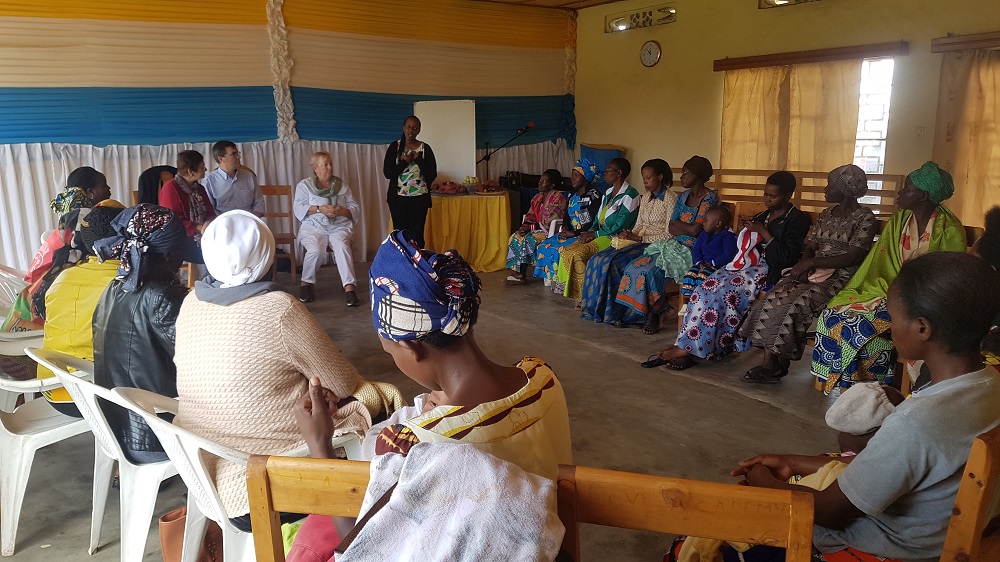
Muhanga, Rwanda. Photo credit: Jude Fuhnwi
Our spaces for peace project in Muhanga ended in 2018 after supporting 30 women, aged between 27 and 65, to heal from wounds of the past. However, these beneficiaries have continued to meet after the project phased out.
“We draw our strength from each other. We are on a journey and we must continue,” said a member of the group when the Interpeace and NAR delegation visited on Wednesday, 4 December 2019.
On their own initiative, they are helping each other to heal and empowering group members through income generating activities.
“They established 3 smaller groups for members based on their proximity. Each of these groups developed an income generating activity to support their economic needs and still continue to engage in discussions for healing,” said Emelienne Mukansoro, Never Again Rwanda’s Psychotherapist in Muhanga.
Members of the group have taught each other different skills in embroidery and market gardening, work together and share proceeds from the sale of their produce.
“We use our hands to become productive and our hearts to feel peaceful,” said one member of the group. Another one added: “We have built ourselves up and will keep going by helping other women to do the same”.
Depressive disorders and post-traumatic stress have damaging effects on societies. Interpeace and NAR have continued to work with Rwandan authorities, the Ministry of Health and communities to support mental health and trauma healing to advance social cohesion in Rwanda.
“It’s been very inspirational, powerful testimonies. They are doing amazing work on mental health and we in Northern Ireland have much to learn from Rwanda on this,” said Monica McWilliams, Chair of Interpeace Governing Board.
Interpeace and the Rwanda Ministry of Health met in Kigali with local and international partners on 4 December 2019, to discuss a scale up of our work on mental health and trauma healing to nurture social cohesion. This new programme will provide psychosocial group support therapy at all administrative levels in Bugesera District, which was hard-hit by the genocide. It will also innovatively introduce mental health support at the level of individuals with particular needs, as well as offer life and vocational skills training, as additional elements contributing overall to social cohesion.
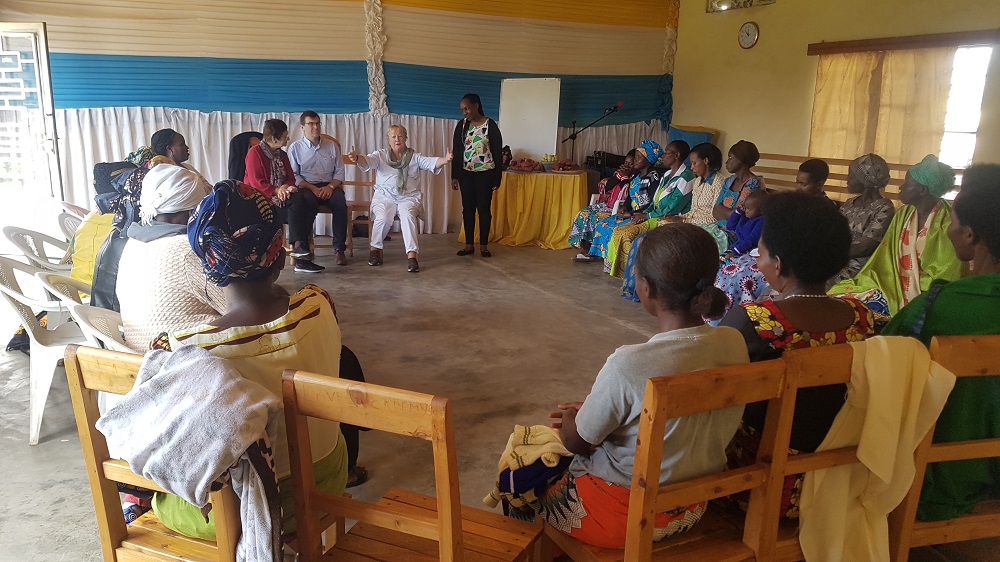
Muhanga, Rwanda. Photo credit: Jude Fuhnwi
*Names of victims changed or not mentioned for privacy reasons
